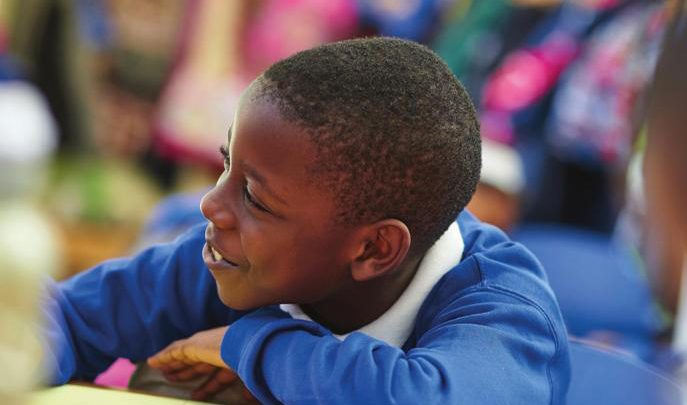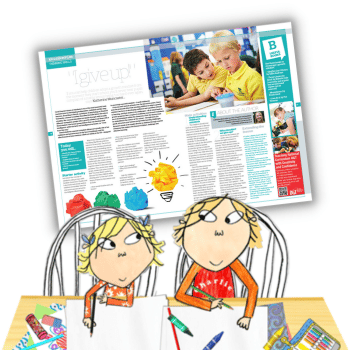Engage With Your Pupils Emotionally – The Benefits Could Be Huge

There’s no quick fix when it comes to engaging emotionally with children and parents, but making the effort, like staff at Water Hall Primary School, can pay real dividends, says Jacob Stow…

- by Teachwire
- Classroom expertise and free resources for teachers

There’s an unusual tranquillity to the start of each day at Water Hall Primary School, Milton Keynes.
It’s part of the very fabric of the grounds – from the decorative (and suitably waterthemed) entrance that serves every child and parent, to the classical music-filled courtyard, leafy and well-stocked with standing stones, through which they must pass to reach the bright, modern classrooms.
“When I go into a classroom today, everyone is engaged in their work – 13 years ago it was just a warzone,” Water Hall’s headteacher, Tony Draper, tells us. If the name sounds familiar, that’s because Tony is the immediate past president of the NAHT.
Starting early
When Tony first arrived at Water Hall more than a decade ago he was under no illusions as to the scale of the challenge he faced. Issues posed by the school’s intake – the proportion of children eligible for the Pupil Premium, and with SEN at Water Hall is well above the national average, while mobility is high – couldn’t be avoided, but the responses to them could be changed.
“At the time the Foundation Stage was in a dire state – and if your Foundation Stage isn’t right, then the rest of the school isn’t,” Tony says. “In the early years you’re developing children’s values and their perception of school. You’re developing their parents’ perception of school as well.
If the staff blame children for where they come from, as happened here many years ago, they pick up on that. They know whether or not they’re valued by the school. And if they’re not, why on earth should parents support you?”
Prior to Tony’s arrival it was Karen Roberts, then a Year 2 teacher and now deputy head, who was tasked with implementing a new approach to the school’s youngest children in the first step on Water Hall’s long road to recovery. “It was about having high expectations, distinguishing what was learning through play and what was play with little or no purpose – and, importantly, improving communication between staff and parents, which was very, very difficult,” she explains.
“Things were quite hostile at the time; there was a lot of friction. Many of the parents had been bullied at school, and therefore felt they were sending their children to school to be bullied. We had to break down those barriers and let the parents know that we cared as much about their children as they did.”
Emotional engagement
Establishing the school’s values and desired behaviours provided a consistency of vision, but more was needed to improve children’s learning outcomes. “We were absolutely convinced that the key to switching children on to learning was emotional engagement,” Tony says.
By chance, both Tony and Karen stumbled upon a means to achieve just that – Kaleidoscope, an approach based on aspects of colour therapy and developed by headteacher Anne Lubbock, also based in Milton Keynes.
Water Hall embraced Kaleidoscope, placing it at the heart of every child’s school experience. Its practical application takes various forms, but the end goal is always the same – to foster self-esteem and a state of mind conducive to learning.
Classroom sessions present children with a sensory focal point – for example, a batterypowered candle and piece of tactile material – and see them engaging in different relaxation techniques. After that, they might play with Play-Doh or pipe-cleaners, or blow bubbles. “In this context it’s very much about getting 30 children relaxed and ready for the day,” Karen explains.
At other times, the children benefit from small group therapy sessions in a specially designed Kaleidoscope room – a soothing environment, fitted with multisensory equipment. “These sessions run for at least 10 weeks,” Karen explains, “but some children will use the programme throughout their school lives, because they need that space and time to re-engage with themselves.”
Go your own way
Tony and Karen are clear that while Kaleidoscope is for everyone at Water Hall, it is particularly effective in supporting the school’s many children who could be classed as emotionally vulnerable. Teachers work to build selfesteem, too – “A lot of our children find it very hard to look at themselves in the mirror, so we draw on mirrors, put sequins on them,” Karen says.
Today, every member of teaching staff is trained to implement Kaleidoscope with their children. “If everyone buys in, then it’s going to make a bigger difference,” Karen notes. And that difference comes to the fore in Year 6, when all the efforts to scaffold self-esteem translate into significantly improved attainment.
That Tony, Karen and the team at Water Hall have turned things around is an achievement made all the sweeter by the fact that the LA at the time was dismissive of their approach. “Our belief in emotional engagement was not shared by the powers that be,” Tony recalls. “We went through a very difficult time where we had to hide what we were doing to improve this school, and play the game with what they were imposing on us.
“We were still doing the things we were being told to do,” Karen clarifies, “We still had the consultants coming in, we were still doing the extra literacy and numeracy. But alongside that we were doing more and more of the emotional engagement.
“As things slowly started to improve, we were doing less and less of what we were told, and more and more of what we wanted. It was really, really tough, but we decided we were going to go down fighting for what we believed in!”
“It’s worked for us,” Tony concludes, “and we now have an LA who are very supportive of what we do, thankfully.”
Pupil voice
Jack Sharp
“Kaleidoscope is good because it relaxes our minds and helps us learn. We do it every day. There’s music too – calm music without words. Everyone in the class says it’s very relaxing. I think things would be noisier without it.”
Owen Wright
“Our 4D room is where we go for learning topics. There are screens on the floor and curtains. We’ll watch pictures and films, and then have a discussion. Afterwards we go back to the classroom to write about what we’ve seen.”
Chantelle Mariera
“Learning cafes get our minds working so we don’t just keep our ideas to ourselves; everyone knows what they’re doing and gets a say. We want to have a growth mindset rather than a fixed mindset, where you accept other people’s comments and things you can improve on.”
Philip Gustov
“At playtimes we have different groups, for example, football, skipping and table tennis. People used to just run outside and wouldn’t always join in, or do silly things. But now we’re together and we know what we’re doing. I like the new way.”










